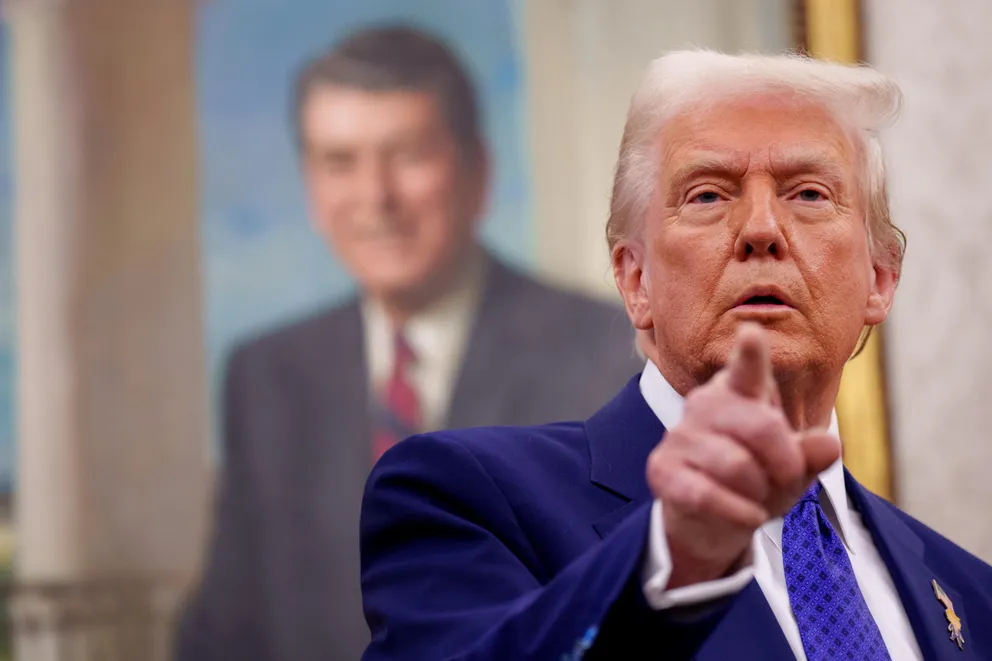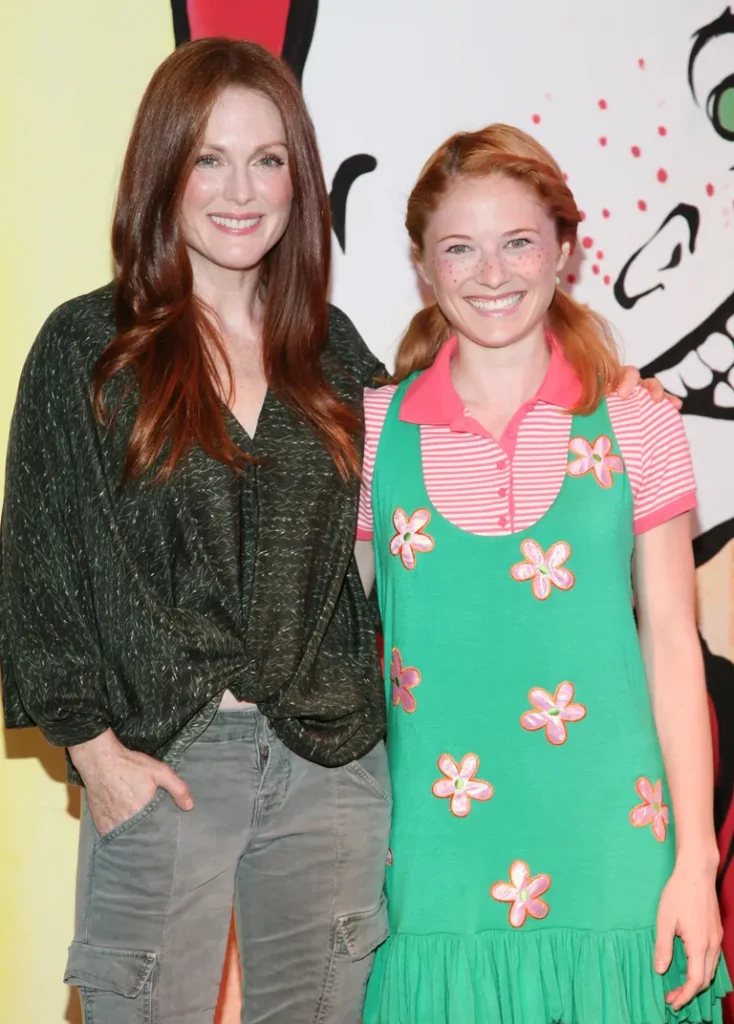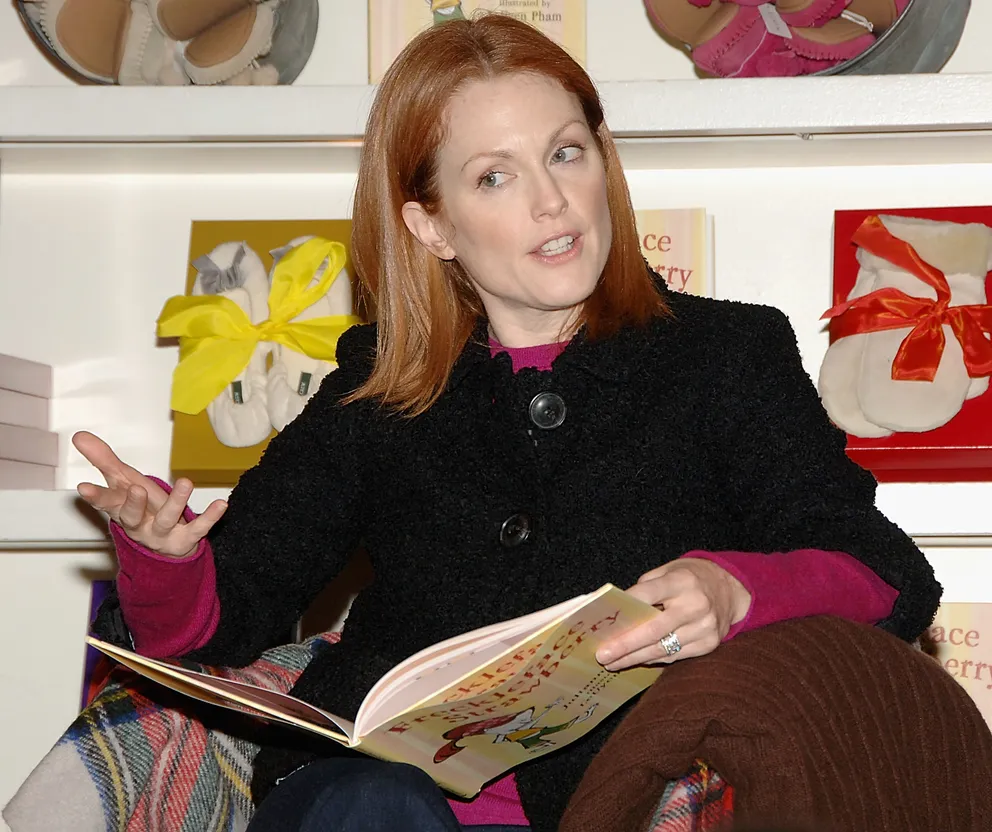The “Still Alice” actress never expected her beloved children’s book to end up on a banned list — but now, she’s speaking out.

Academy Award-winning actress and author Julianne Moore has expressed shock after learning that her children’s book, “Freckleface Strawberry,” has been banned in certain schools operated by the U.S. Department of Defense (DoD).
Moore took to Instagram on February 16, 2025, to share her dismay over the decision, which she attributes to the Trump administration.

In her post, Moore described “Freckleface Strawberry” as a deeply personal and semi-autobiographical story about a seven-year-old girl who initially dislikes her freckles but eventually embraces them.
She wrote the book to teach children about self-acceptance, noting that “we all struggle, but are united by our humanity and our community.”
The 64-year-old actress, who is a proud graduate of Frankfurt American High School — a DoD school once located in Germany — expressed particular disappointment that students in similar circumstances would not have access to her book.
She highlighted her strong military ties, mentioning that her father was a Vietnam War veteran who dedicated his career to the U.S. Army.
“It is galling for me to realize that kids like me, growing up with a parent in the service and attending a @dodea_edu school, will not have access to a book written by someone whose life experience is so similar to their own,” she stated.
Moore went on to say, “And I can’t help but wonder what is so controversial about this picture book that cause it to be banned by the US Government.”
She also expressed sadness over the restriction, emphasizing her belief in the constitutional right to freedom of speech and expression.
Moore concluded her post by thanking PEN America, an organization dedicated to protecting free expression, for bringing the issue to her attention.
Originally published in 2007, “Freckleface Strawberry” follows the journey of a young girl who sees herself as just like everyone else — except for her red hair and freckles, which make her feel different.Over time, she learns to embrace these unique features, ultimately understanding that individuality is what makes people special. The book, aimed at young readers, promotes themes of self-acceptance and confidence.
The Department of Defense Education Activity (DoDEA), which oversees schools for military families, has stated that the restriction is part of an ongoing review of instructional materials.
According to DoDEA spokesman Will Griffin, the agency is ensuring compliance with two executive orders issued by President Donald Trump.These orders limit discussions on transgender topics and seek to prevent what the administration refers to as “radical indoctrination” in schools that promote diversity, equity, and inclusion (DEI) initiatives.
In a statement, Griffin explained that DoDEA is currently assessing its library collections and teaching materials.
Books that fall under the categories of “gender ideology or discriminatory equity ideology,” as defined in Trump’s orders, are being temporarily relocated to a separate collection for review. During this process, access to these books is restricted to professional staff members.
A recent memo circulated by the Department of Defense also confirmed that the agency is reviewing a “small number of items” that may be affected by these policies.
Among the books under scrutiny is “Freckleface Strawberry,” which is aimed at children between four and eight years old and tells the story of a young girl learning to embrace her freckles.

Moore has previously spoken about how “Freckleface Strawberry” is deeply personal, drawing inspiration from her own childhood experiences.
In a 2013 interview with Entertainment Weekly, she described the main character as a reflection of herself at age seven — short, playful, and struggling with self-consciousness over her freckles.
She emphasized that the character is not a princess or a magical figure but rather a regular child navigating everyday challenges.When discussing how she approaches writing the books, Moore explained that she considers what is important to a young child.
“I think children’s concerns are different than adult concerns, and they see the world differently,” she said. The “Hannibal” alum also noted that her goal is to capture the perspective of a child rather than an adult looking back.
The “Freckleface Strawberry” series includes stories inspired by real events from Moore’s life. She recalled how much she disliked dodgeball as a child, using that memory as the basis for one of the books.
Rather than hiding from the game, she would deliberately step forward and get hit early to avoid being the last one standing. “For me, dodgeball was torture,” she admitted, explaining why she felt it was a relatable experience for children.Moore has often joked that her children’s books serve as an alternative way of sharing her autobiography. “I always make jokes, like when I talk about the books, I’m like, ‘They’re all autobiographies!'” she said with a laugh.
While the stories are fictionalized, they remain grounded in experiences that shaped her own childhood.Since its debut in 2007, “Freckleface Strawberry” has grown into a popular series aimed at helping children embrace their differences.
The books feature bright illustrations, simple language, and repetitive sentence structures, making them accessible to young readers.As part of the Step Into Reading program, the books are designed for children who are beginning to read independently but may still need some guidance.
The restriction of “Freckleface Strawberry” in some U.S. military-run schools has sparked concern, particularly for Julianne Moore, who based the book on her own childhood experiences.

As the Department of Defense reviews its library collections under new policy guidelines, the debate over book bans and their impact on children’s literature continues.